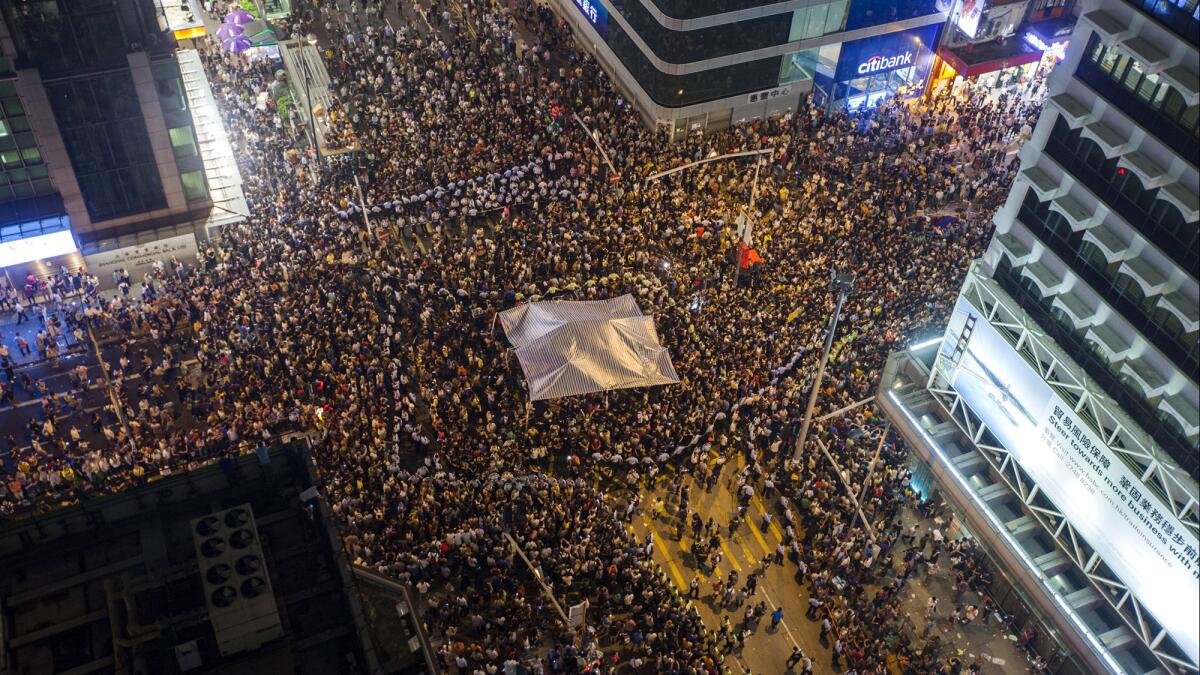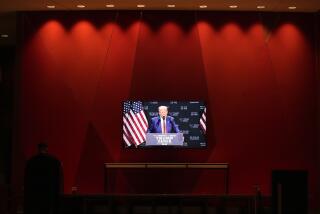Column: Trump’s silence on Hong Kong is making America weaker

- Share via
WASHINGTON — As China and its unruly possession Hong Kong teeter on the edge of catastrophe, President Trump has issued a series of messages with a common theme: If his friend Xi Jinping decides to crack down on the city’s pro-democracy movement, the United States will understand.
It’s the wrong message — not only because it abandons American values, but because it hurts America’s strategic interests as well.
Here’s how Trump described the Hong Kong crisis two weeks ago: “They’ve had riots for a long period of time. And I don’t know what China’s attitude is. Somebody said that, at some point, they’re going to want to stop that. But that’s between Hong Kong and that’s between China, because Hong Kong is a part of China. They’ll have to deal with that themselves.”
It was a green light for Xi to intervene with force. There was no call for restraint, no acknowledgment that the people of Hong Kong have legitimate complaints about political repression and police abuses.
And it set off outrage in Washington — not only from Democrats, but from Republicans who remember when Ronald Reagan made human rights a conservative touchstone. Even Senate Republican Leader Mitch McConnell, who rarely challenges Trump, made clear his unease.
“The people of Hong Kong are bravely standing up to the Chinese Communist Party as Beijing tries to encroach on their autonomy,” McConnell said. “Any violent crackdown would be completely unacceptable.”
Those were notes a normal president might have sounded. Not Trump.
Instead, after hearing the complaints, he issued a mild clarification: China should “deal humanely with Hong Kong.”
“I know President Xi of China very well. He is a great leader,” Trump tweeted. “If President Xi would meet directly and personally with the protesters, there would be a happy and enlightened ending.”
It’s not surprising that Trump’s instincts led him to side with his purported friend Xi against the popular uprising.
This president has never shown any discernible interest in using foreign policy to promote democracy overseas. Instead, he’s lavished praise on foreign autocrats from Xi and North Korea’s Kim Jong Un to Russia’s Vladimir Putin and Saudi Arabia’s Mohammed bin Salman.
After China sent tanks and armed troops to crush pro-democracy demonstrations in Beijing in 1989, killing hundreds or more, Trump expressed admiration.
“When the students poured into Tiananmen Square, the Chinese government almost blew it,” he told Playboy magazine in 1990. “Then, they were vicious, they were horrible, but they put it down with strength. That shows you the power of strength.”
His current silence isn’t only about values. It’s also about hard-headed American interests: keeping Asia peaceful, countering China’s growing military might, and maintaining U.S. influence in the Asia-Pacific region. Trump’s messaging has been harmful on all those counts.
If Xi crushes what remains of democracy in Hong Kong by force, the result will be a major crisis in U.S.-China relations. Don’t take my word for it; that’s what Trump’s national security advisor, John Bolton, says.
“It would be a big mistake,” he told Voice of America last week. “A misstep by the Chinese government, I think, would cause an explosion on Capitol Hill.” On this issue, Trump seems to be a minority of one — not only in his party, but in his own administration.
A bipartisan group of senators has already introduced a bill that would impose sanctions on Chinese officials if they suppress basic freedoms in Hong Kong.
That election-year trade deal with China that Trump has been promising? Even Trump’s supporters may be unhappy if it involves blood in the streets of Hong Kong.
Even worse, if Xi interprets Trump’s acquiescence on Hong Kong as validation for his assertive instincts, he could be emboldened on other issues, including China’s claims to Taiwan and its efforts to militarize disputed islands and shoals in the South China Sea.
“One lesson of history is that you have to insist on principles of behavior early, or ambitious autocrats will keep asking for more,” Larry Diamond, a democracy scholar at Stanford, told me. “If we don’t confront China’s movement toward dominance in Asia, eventually we’re looking at the possibility of war between the United States and China — or else a series of Munich agreements while we retreat.”
Trump’s disdain for democratic values comes at a practical cost too.
He’s giving away a significant asset: the legitimacy the United States earns by standing for something people admire, even if we aren’t always consistent about it. That’s what Harvard scholar Joseph Nye has dubbed “soft power,” the ability to persuade other countries to do what we want through persuasion and attraction rather than force or coercion.
The United States has soft power; China doesn’t. It’s one of our advantages in global competition. Giving it up makes us weaker.
Let’s be realistic: Xi views Hong Kong as a domestic issue and a challenge to his personal authority. Even loud U.S. warnings might not slow him down.
But the Chinese leader needs to know that America stands for more than soybean sales, and that the consequences of a crackdown would be dire. Trump’s messages have suggested the opposite. He needs to fix that while there’s still time.
More to Read
Get the L.A. Times Politics newsletter
Deeply reported insights into legislation, politics and policy from Sacramento, Washington and beyond. In your inbox three times per week.
You may occasionally receive promotional content from the Los Angeles Times.











